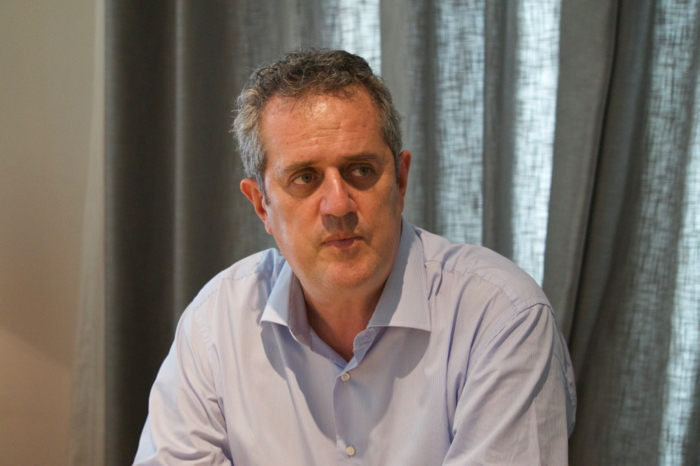16.10.2017 - 16:55
|
Actualització: 16.10.2017 - 16:56
We have entered a decisive phase in Catalonia’s independence process. After last week’s declaration in parliament was put on hold by Catalan president Carles Puigdemont, we have entered an uncertain period with a call to dialogue which the Spanish government has hastened to reject. The Spanish authorities have announced the first legal steps to invoke Article 155 of the Spanish Constitution, which might impose Madrid’s direct rule on Catalonia. At this crucial point in time, Catalonia’s police force (the Mossos d’Esquadra) may play a critical role, as they did on the day of the referendum.
We meet Catalan Interior Minister Joaquim Forn to discuss the present and future security challenges that Catalonia is facing. Will there be a clash between the various police forces, if two competing legal frameworks co-exist? We start our conversation by asking him about the muddle this past week.
—Are we independent yet, or not?
—Parliament approved the declaration of independence and then put it on hold. Therefore, the declaration was approved, merely its effect has been suspended. I feel it is important to stress this point because we had never got this far in the history of Catalonia. A majority voted for independence in the referendum held on October 1. This allows us to proclaim independence and put that on hold, following the president’s request. It’s an important step that anticipates everything that will eventually unfold very soon.
—And what do you expect will happen?
—I can understand that some people may not sympathise with the decision we have taken. It is important because there was a clear Yes win in the referendum, but it is equally important to give dialogue one more chance after having listened to the appeals we have received at home and abroad. We will see whether there is any chance of reaching an agreement. Many international actors who are critical for the future recognition of our country had asked us to agree to this gesture. That’s the whole idea.
—Despite Puigdemont’s gesture, Madrid has begun preparations for Article 155. How should Catalonia respond?
—Without haste. Spain feels right at home when it comes to rejecting dialogue. We must be patient and make the most of this moment. The president has suggested that each government appoints two representatives who would then accept a mediator. It is a very clear, unconditional offer. We must stick to our offer and let Madrid choose between dialogue or crackdown.
—The cruise ships docked in Barcelona and Tarragona where the Spanish police are quartered have extended their lease another eight days. How do you feel about that?
—They are still stuck on the path of fear and threats. When it comes to security issues, there is something even more worrisome. It’s not just about these police officers staying in our ports. That is bad enough, because my government has asked them to leave, as they are not needed. All they’ve done is stir up trouble and make people uneasy. We had predicted what’s happened eventually. But, as I was saying, there’s more to it. There is a clear attempt to take back Catalonia’s powers on security matters. These powers are enshrined in our Statute. We had mentioned how, in the aftermath of the terrorist attacks on August 17 which the Spanish PM and his deputy lived through from the ministry’s HQ in Barcelona, the Spanish state simply went missing in Catalonia on all security matters. They realised that and now they are striving to take back those powers.
—Has your ministry estimated how many Spanish police officers there are in Catalonia at present?
—No. All we know is what they have told us. They claim there are ten thousand officers. I believe that figure has gone up and down depending on their specific needs at any given time. When they needed police in Aragon or the Valencian Country, they’ve had to send them from Catalonia. Easily they have ten thousand officers based here.
—Did the Mossos d’Esquadra ignore the instructions issued by the judge on the day of the referendum?
—Not at all. The Catalan police did a great job of carrying out their duties following the instructions they had received. It was a court order that I disagreed with, but the Mossos d’Esquadra have always obeyed every order they’ve received from a judge. What sets apart our model is the way a court order is complied with. We did it in a wholly transparent manner. I’d like to point out that two or three days before the referendum we had already explained how the Catalan police would go about things. It was explained in a totally transparent way. Mossos d’Esquadra shut down polling station without the use of force and without injury. Their performance was impeccable.
—Has the Catalan police force been taken over?
—No. Obviously, it hasn’t. They tried to, in a very sloppy way. The prosecutor’s office decided to appoint a coordinator for all three law enforcement agencies in Catalonia [Mossos, Spain’s Policía Nacional and Guardia Civil]. They picked someone (Pérez de los Cobos) close to the Spanish government’s Interior Ministry. I’ve said it before and I’ll say it again: he is a fascist, someone who sided with those who staged the far-right coup d’état led by Tejero in 1981. Everyone should realise what sort of people are leading the Spanish police, well into the 21st century. The fact that someone like that can run the police gets you thinking. These days he has played a very sad role, leading from the shadows. His performance in a coordinating capacity has been regrettable, more so because he ordered the raids by the Guardia Civil and the Spanish police. He is the main culprit of that situation. It is also true that Mr Millo [the Spanish government’s representative in Catalonia] could have done something to stop it, but chose not to. His conduct was also very disappointing. Pérez de los Cobos will be held accountable for the violent events on the day of the referendum.
—On the subject of security, is Catalonia ready for independence? Surely some steps still need to be taken to ensure full control …
—We’re missing several things which are currently within the powers of the Spanish state. For instance, border control, immigration service, customs … all that is an important part which is presently handled by the Spanish police and Guardia Civil. The minute we become an independent country, we must be able to guarantee and deploy those services. The fact that we have an integral police force that is greatly appreciated in Catalonia —as well as abroad— is key. More so after the August attacks. We can guarantee the safety of the public in Catalonia, but also in Europe as a whole. You see, one of questions we are asked when we explain that we want to be independent is whether we can guarantee the security of the new state’s territory. We are pleased with the international recognition we have received because it shows that we have been working in the right direction for years. Our police force is on a par with the best worldwide. I should add that the Mossos enjoy massive recognition at present. After the attacks, as well as now. If there is one thing I am proud of, it is the huge recognition of the Mossos by the general public.
—Is there work to be done in terms of information services and intelligence?
—There is room for improvement. Nowadays global security challenges must be tackled with good intelligence, as well as sharing information with other countries and liaising with other law enforcement agencies. We have not had sustained access to police information from other countries. We are not allowed to liaise with foreign intelligence services. Actually, we’ve even struggled to get information from Spain’s own intelligence community. The chance to be independent would allow us to access all those information networks. This is essential to guarantee internal security in any country.
—Accessing foreign information, sure, but do you also need your own intelligence service?
—Yes, it is of utmost importance. We have the Mossos’ general information unit. Obviously, police work needs muscle nowadays, but intelligence is a basic component to perform effectively. No country or police force would give that up.
—Spain has denied the Mossos access to international police intelligence and coordination efforts. Has that changed since the attacks on August 17?
—Believe it or not, nothing has changed. In fact, certain things have actually got worse. We all recall what happened when some information was leaked to certain media those days. Where did the tip-off come from? From Spain’s CITCO (Intelligence Centre for Counterterrorism and Organised Crime). And, what a coincidence, CITCO is led by the same person who headed UDEF [the Spanish police’s Financial Crime Unit] when they fabricated reports to smear Artur Mas and Xavier Trias. We have had to deal with huge difficulties. And after the August attacks, we have not received any further European-level alerts. There are people who use security for their own partisan ends, and that is unacceptable.
—At what point will the Mossos start protecting Catalans from the violent attacks by Spain’s Policía Nacional and Guardia Civil?
—I understand that people are wondering about that. But we must do things properly. Today’s law is Spanish and, despite our powers, those police forces are allowed to operate in Catalonia. Obviously, they cannot do so like they did on October 1. We have filed a complaint. But we are a responsible government and the worst disservice we could do the Mossos would be to allow a clash between police forces. We must be responsible and try to resolve problems by political means. There is no point in keeping all those police officers in Catalonia. As an integral police force, we must undertake all duties to do with general policing. If that is respected, we won’t encounter the same problems again.
—Considering the Spanish state’s crackdown strategy, a conflict cannot be ruled out.
—No doubt there will be difficult, complex situations. But they will need to be dealt with professionally and in good faith. We have the experience of other countries before us and, provided there’s goodwill and the new political reality is accepted, there will be no clash between the various police agencies.
—Do the Catalan police and your ministry receive support from abroad on security matters?
—We have shared experiences with some nations. That is to be expected, because ours isn’t the number one police force in the world. There are many others we can learn from and we can share our experiences with. This sort of exchange is very positive. There are police officers that come to Catalonia to learn. We have high standards here and, therefore, there are police officers who want to come over and learn from us. It is a normal exchange.



